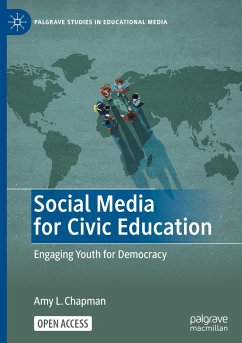
Politics of Civic Education
Local Reactions to National Initiatives and State Mandates

PAYBACK Punkte
51 °P sammeln!
This book chronicles the progression of civic education advocacy since the early 2000s. It identifies the main actors that called for civic education reform, describes their motivations and policy platforms, and documents the path taken to capture state policy agendas. It argues that No Child Left Behind incentivized civic education advocates to mobilize a "call to action" to restore emphasis on civics that materialized into national policy reform proposals that successfully captured the agendas of state legislatures and bureaucracies. This book analyzes the implementation and sustainability o...
This book chronicles the progression of civic education advocacy since the early 2000s. It identifies the main actors that called for civic education reform, describes their motivations and policy platforms, and documents the path taken to capture state policy agendas. It argues that No Child Left Behind incentivized civic education advocates to mobilize a "call to action" to restore emphasis on civics that materialized into national policy reform proposals that successfully captured the agendas of state legislatures and bureaucracies. This book analyzes the implementation and sustainability of these civic education policy reforms by undertaking a comparative case study analysis of school districts in Utah and Connecticut. Through the voices of teachers and district administrators, the book tells the story of what happened when these state policy reforms inspired by national initiatives hit the local level where the rubber meets the road. As ideological debates about schools and democracy unfold across the country, as civic education advocates and proposals proliferate, this book treats civic education not as panacea but as a concrete policy area to be analyzed and understood. It contextualizes the current debate and offers a critical assessment of the most recent, comprehensive state-level civic education policy reform. It argues that while questions linger about what type of civic-inspired educational interventions remains most effective for whom, where, and why, the implementation of such interventions are profoundly impacted by local actors and local politics and that future initiatives should take this dimension into consideration.














